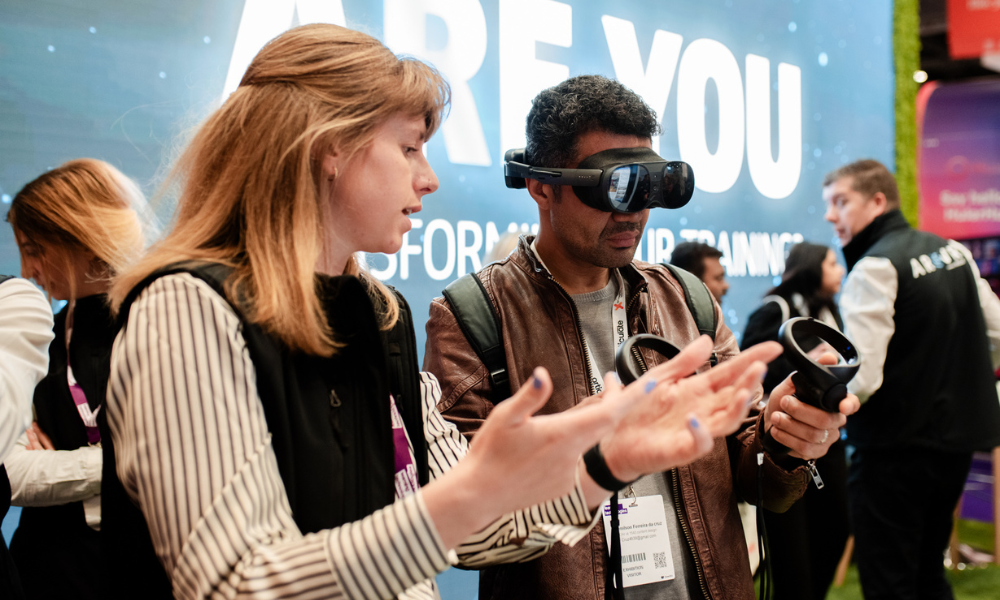Igniting a creative spark: How can you make online training more interesting?
)
In the corporate L&D world, sometimes there is a fear that your employees aren't engaging because of one simple — albeit harsh — reason. Your training is boring. A poll conducted by City & Guilds found that 69% of UK workers felt that the training for their corporate job left them 'bored and disinterested'.
Training is crucial for your employees' growth within the organisation, their personal growth as a professional, and also when it comes to building a culture of teamwork and collaboration. The importance of online training is even more prevalent as most of what we do now is digital; especially if your employees need to connect with teams across the country or wider world.
Let's dive into how you can revamp your online training and courses to be more fun, and feel less like work. We'll examine the psychology behind what makes learning fun and creative steps you can take to implement in your organisation.
The brains behind the organisation: What makes learning 'fun'?
The key psychological factors to achieving a sense of 'fun' and enjoyment come down to five things: motivation, autonomy, socialisation, achievements, and finally, positive reinforcement. The first is the power of 'intrinsic motivation' — this is when employees find the training relevant to both their professional role and interests. This makes the training inherently enjoyable, and therefore they are more likely to engage with it. Autonomy allows employees to have a say in their learning process. This can significantly boost engagement as they feel more in control, which again boosts their motivation and participation levels.
Humans are inherently social creatures. This is why social interaction and the element of socialisation is paramount to training, and with the vast array of digital tools we have now, remote work shouldn't be as much of an obstacle. Training programs that incorporate social elements, such as group activities or discussions, can enhance engagement through collaborative learning. Bringing employees together like this also works towards a better working environment, and being mindful of those more introverted or shy, will ultimately make for an inclusive workplace too.

A sense of achievement and mastery is really important for employees' psychological needs at work. Providing opportunities for employees to demonstrate their skills and see their progress can foster a sense of achievement, and this encourages them to not only complete training, but also actively take in what they're learning. Things like gamification elements such as badges, leaderboards and progress tracking can be very effective here.
Finally, positive reinforcement is historically one of the most discussed and researched topics in psychology. A certain Pavlov and his dogs may ring a bell! Positive reinforcement comes from recognising and rewarding employees for their participation and achievements in training sessions, which can create a positive feedback loop and encourage further engagement.
Transforming training: Steps you can take to engage your employees
Gamification
- Identify key learning objectives and break them down into smaller, 'gamifiable' tasks
- Choose a suitable gamification platform or develop custom solutions
- Integrate leaderboards, progress tracking, and reward systems to motivate participants
Interactive workshops and simulations
- Develop realistic scenarios relevant to your industry and job roles
- Facilitate workshops where employees can practice and refine their skills in a safe environment
- Incorporate debriefing sessions to discuss learnings and feedback
Peer learning and mentorship programs
- Pair employees with mentors who can guide them through their learning journey
- Create opportunities for employees to share their knowledge through presentations, workshops, or collaborative projects
- Encourage the use of internal communication tools for continuous knowledge exchange
Microlearning and on-demand content
- Break down comprehensive training content into bite-sized modules
- Use various formats like videos, podcasts, infographics, and interactive quizzes
- Make the content available on-demand through an easily accessible platform
Incorporate Virtual and Augmented Reality
- Identify training areas where VR/AR can add significant value, such as safety drills or technical skills
- Partner with tech providers to develop custom VR/AR training modules
- Provide necessary equipment and support for employees to participate in VR/AR training sessions

Assess your organisation's training needs and get started! Conduct surveys, focus groups, and interviews to gather insights, and then begin using this information to build your new, improved fun courses. One final tip is performing a pilot of a program or online course can be beneficial — get feedback from a small group first before diving in altogether.
By understanding the psychology behind engaging training and implementing creative strategies, you can transform your corporate training programs into enjoyable and effective learning experiences. And hopefully, you can have some fun on the way!
Resources
Article on City & Guilds study: https://www2.staffingindustry.com/eng'/Editorial/Daily-News/UK-Disengaged-workforce-calls-for-bespoke-training-approach-study-finds-50378
Positive Psychology article: https://positivepsychology.com/positive-reinforcement-workplace/
Maslow, A. H. (2013). A theory of human motivation. Psychological Review, 50(4), 370–396. Simon and Schuster.
eLearning Industry article: https://elearningindustry.com/play-and-learn-exploring-the-power-of-gamification-in-employee-learning-and-development
Pavlov, I. P. (2010). Conditioned reflexes: an investigation of the physiological activity of the cerebral cortex. Oxford University Press.
LinkedIn article by Peter Coe, Director of Technology, Artificial Intelligence and Innovation at Ingensys Ltd: https://www.linkedin.com/pulse/how-ar-vr-shaping-corporate-training-peter-coe-2buue/
The Learning Guild article: https://www.learningguild.com/articles/the-push-pull-of-leading-motivation-using-microlearning/


)
)
)
)
)
)
)
)
)
)
)
)
)
)
)
)
)
)
)
)
)
)
)
)
)
)
)
)
)
)
)